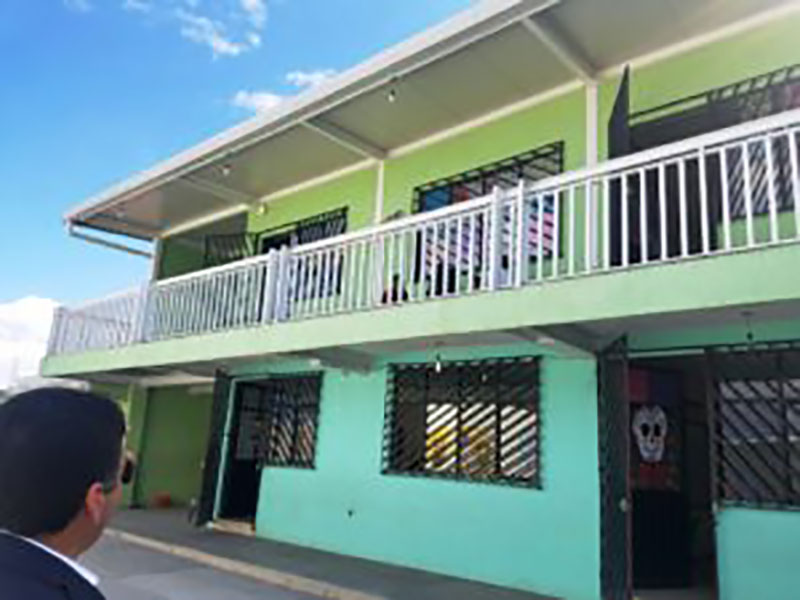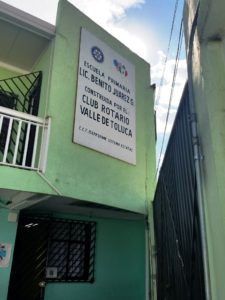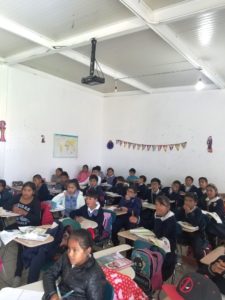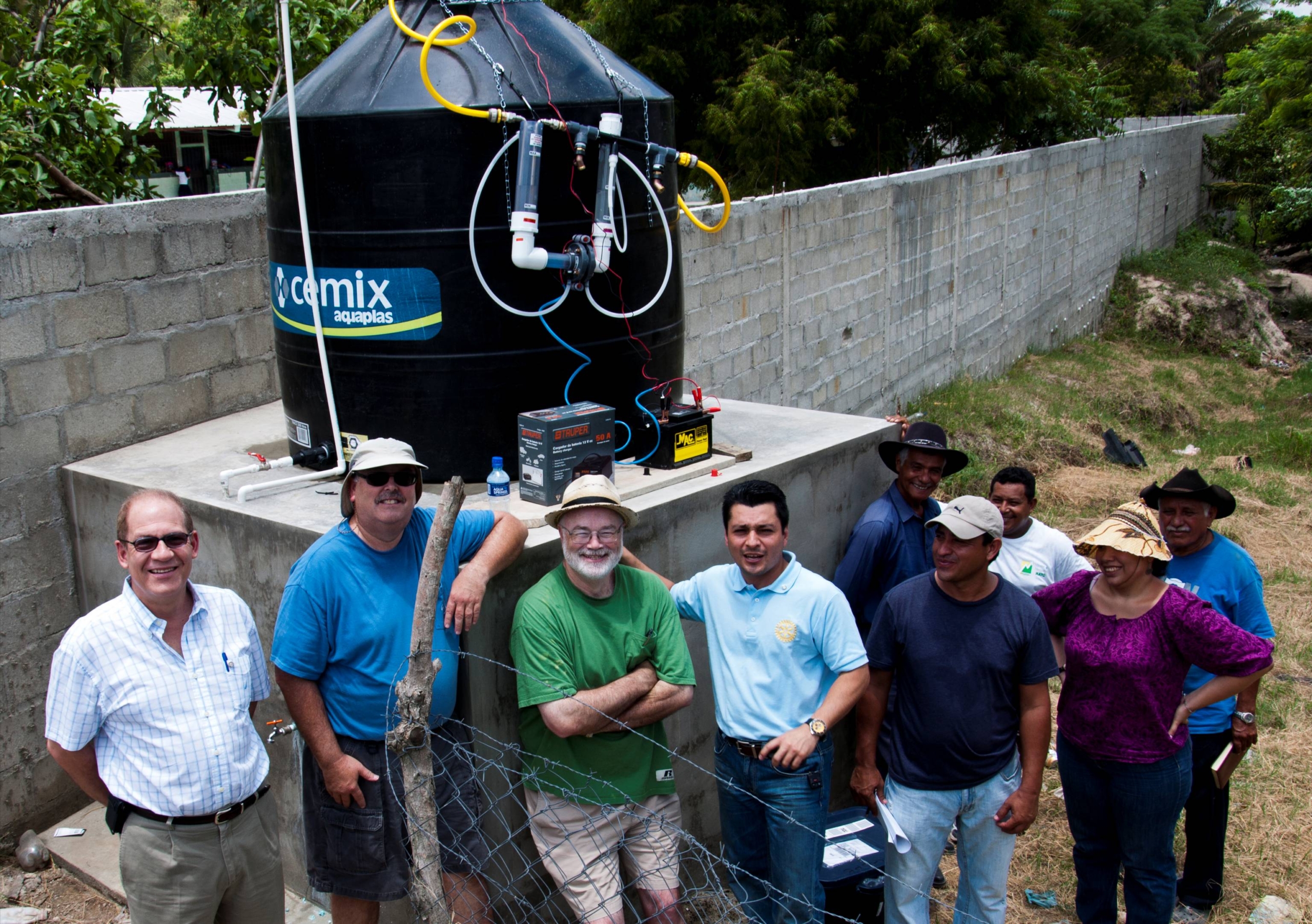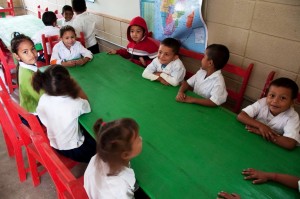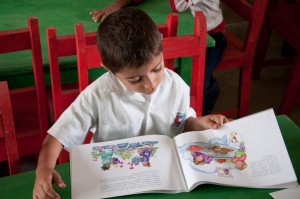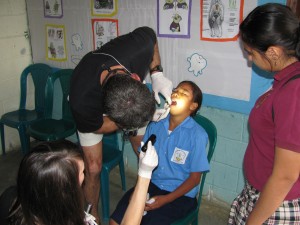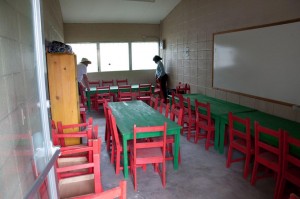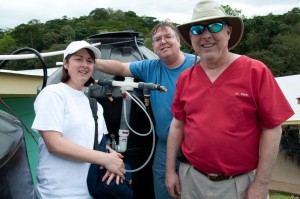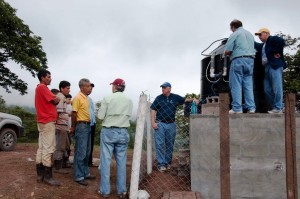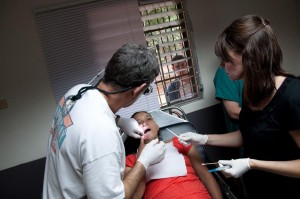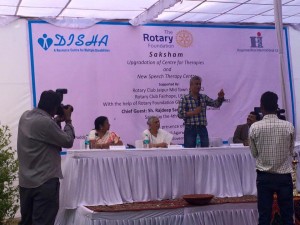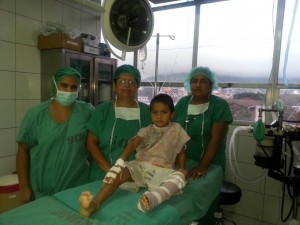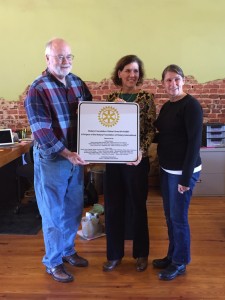National & International Projects
San Juan Tilapa School Project
Several years ago, the Rotary Club of Valle de Toluca, near Mexico City, recognizing that education is the best path out of poverty, began to build a school in the small village of San Juan Tilapa. At the time, the nearest elementary school was 35 miles away, over dirt roads, so education was not really a possibility for the children of San Juan Tilapa until the Benito Juárez García school was built.
Beginning with just two classrooms, the club, with financial assistance from clubs in the United States, later added a second building containing two more classrooms, an office, and bathrooms.
The next addition was a cafeteria, where the students get breakfast and lunch.
Two years ago, a second floor was added to the second building to provide a library, another classroom, and a computer lab.
In early 2019, the Rotary Club of Fairhope partnered with Heart 2 Heart to pay for construction of a second floor on another building to provide an auditorium/community center. The Heart 2 Heart Program is a cooperative effort between Rotarians in the “Heart of America” (Zones 30 and 31) and “Heart of Mexico” (Districts 4170 and 4140). Our club, through its foundation, coordinated the transfer of funds from U.S. clubs to the Valle de Toluca club for this purpose. The total project expense was estimated at $50,756.12, of which we paid $30,000—$10,000 from the club’s operating funds (fundraiser proceeds designated for charitable activities) and $20,000 from the club foundation.
Honduras Clean Water Project
The club’s earlier interest in Honduras, evidenced by collection of dental equipment and supplies that were shipped to Hospital Evangelico in central Honduras in 1999, came to fruition in a hands-on project in 2008.
In early 2007, some of our members who had been independently involved in non-Rotarian mission projects in Honduras brought to our attention the need for a water heater at the Our Little Roses girls’ orphanage in San Pedro Sula. After a lot of research and planning and budgeting for this project, the lack of response from the orphanage led us to realize that hot water was not what was needed: in this subtropical climate, unheated water was acceptable; what was really needed was clean water.
By early 2008 we had changed our focus to providing water purifiers. For these projects, local volunteers performed the upfront site work (at our expense), and our project team then installed the equipment: a Maguire Filter Chlorinator, a 700-gallon storage tank, a tablespoon of salt, and a car battery. The first trip, to Ocotillo, Cortés, Honduras, was over Memorial Day weekend (May 23–26) in 2008, and the team was made up of Bob Callahan, Gene Brabston, and Seth Moore. Together they installed a water purifier that would run on an automobile battery and table salt. Gene, the dentist who had spearheaded the earlier collection of dental supplies and equipment, also took dental instruments to perform some dental work.
While they were in Ocotillo, the team became aware that the local school, República de Mexico, sponsored by the Rotary Club of San Pedro Sula, had a room set aside for a library that currently had no tables and chairs, no shelves, and no books. So our second mission trip would include building furniture and donating books collected by members. On this trip, February 24–27, 2009, Bob and Seth were joined by members Dave Darnell and John Martin as well as Mobile dentist Jimbo Martin and Michael Chambers, president elect of the Mobile club, and his daughter. The team built and installed shelving and furniture for the library, delivered the library books, and also delivered personal hygiene bags put together by members of the Rotary clubs of Chilton County, Demopolis, Enterprise, Greene County, Monroeville, and Robertsdale.
In addition, Jimbo treated 300 dental patients in two days.
For this trip, the club had received a $1,500 District Simplified Grant. We noted that “This may not seem like a lot, but it was 7% of the total grant amount of $24,995. Although four other clubs received an equal amount, only one (Dothan) received more.” It was also a significant portion of the $3,500 budgeted for the project, which was intended to pay for “40 chairs @ $15, four tables @ $75, plus shelving and a core selection of books.” On all of these trips, many participants paid their own way, though in some cases air miles were donated, but we also diverted travel funds originally budgeted for our club presidents’ attendance at international conventions.
On the third trip, in May 2009, we were back to water purifiers, which were to become our signature project. Two more filtration systems were installed, together providing clean water for 1,500 more people.
It was at this point that the project began to expand exponentially. Under the leadership of Michael Chambers, the Rotary clubs of San Pedro Sula and Mobile put together an application for a Health, Hunger & Humanity (3H) grant from the Rotary Foundation. The San Pedro Sula club put in $2,000; the clubs of Mobile, Mobile Sunrise, and Fairhope budgeted $4,000 each; an anonymous donor contributed $10,000; District 6880 provided matching funds; and the Rotary Foundation approved Matching Grant 70708 for $24,400, making a total of $66,400 for 16 more water systems in Honduras, with the participating clubs taking turns to send teams to install them.
Our fourth trip, held during Mardi Gras season (February 14–18) in 2010, included a medical/dental component. Bob Callahan, Dave Darnell, and Seth Moore were joined by Brad Rowe, a dentist friend of Dave’s from his home club in Cheboygan, Michigan; physician Rob Clark; nurse Kelly Powell; and Jason Thomas as photographer to document the trip and create publicity about it. From a home base in San Pedro Sula, the team trekked to the villages of El Ocotillo, Santa Bárbara, Las Vegas, and El Edén. They installed three water units and “pulled a lot of teeth.”
In May 2010, the Mobile Sunrise club installed four more filtration units, bringing the total to 10, and we were back down there in June (our fifth trip) to install five more, with Mobile Sunrise planning to do “the last four” in August. Between work trips there had been scouting trips to find suitable locations for the filters.
On August 25, Bob Callahan, then an Assistant Governor, presented a report on the status of our Rotary Foundation Matching Grant 70708 in which he explained that the magic of Matching Grants is that a club or clubs in one district joins forces with a club in another district to provide funds for a project in one of the districts, and TRF contributes 50 cents for every dollar raised by the clubs and districts. Although grants were severely restricted last year, he said, our request for $66,400 was fully funded, an indication of the Foundation’s view of our worthwhile project of providing clean water to villages in Honduras. As noted above, the grant application was written by a member of the Rotary Club of Mobile, and the Mobile Sunrise club also contributed, along with our club and the one in San Pedro Sula. But TRF approval of a grant application requires more than money from the local clubs. Each club must commit to active participation in the execution of the project; Rotarians must use their vocational skills in service to others. The grant can be used only for materials; Rotarians pay their own way. Using the funds provided, he reminded us, we had so far installed 16 water purification systems, and we expected to install four more.
In addition to the participating clubs, Bob pointed out, the mission had received the support of the Mobile Rotaract Club, the Interact Clubs at Fairhope High School and St. Paul’s School, and several other Rotary clubs, including Dave Darnell’s club in Cheboygan, Michigan. Bob showed a number of slides illustrating the need for these water systems and the way they are managed and maintained. One way the availability of parasite-free water had changed lives was that school attendance had improved. Good news/bad news: People from neighboring communities were walking 1½ hours to get water from these wells.
By late August, another grant project was under way. The Rotary clubs of Mobile (spearheaded by PP Michael Chambers) and San Pedro Sula had written a Matching Grant proposal for a chicken farm project in Honduras. This became Project STEP (Structures Targeting Egg Production) in El Edén, Honduras. Our club immediately signed onto this one as well and also made two more trips to Honduras to install filtration systems.
The first of these, trip #6, took Bob, Seth, and Johnny Thomas to Honduras in February 2011 to install five more filters. In November of that year, Bob (making his thirteenth trip) and Seth were accompanied by Rick Phyfer, James and Terri Allen, Necie Borroni, optometrist Kim Dunagan, and Fairhope High School student Anna Grace Claunch, whose “Running for Water” fundraiser had raised $2,700 for the project (an additional $6,100 was raised by the sale of hats and bracelets made in Honduras). Together the team (shown below) installed filtration units 27–30 on the seventh and final trip.
In sum, the 3H grant intended to cover 16 filters actually covered 19; others were paid for by clubs, for a total of 34. The seven trips we made between April 2008 and November 2011 directly involved 18 Rotarian and non-Rotarian volunteers (many of them on multiple trips). Estimating that each water filter serves 300–750 people, the 30 that were installed are bringing clean water to 9,000–22,500 men, women, and children. The total cost of over $100,000 was shared by our club and others, District 6880, and The Rotary Foundation through a Matching Grant. Our club directly contributed $28,000 (including $4,000 toward the Matching Grant), plus $8,800 from sale of hats and bracelets and Anna Grace Claunch’s Running for Water fundraiser, as well as other private donations. Personal travel expenses for the 35 participants totaled more than $30,000. In addition to assuring potable water, we have provided medical and dental care to hundreds of people, furnished an elementary school library, and started an egg production project.
Microfinance Project
In 2012, we turned our attention to a new kind of project. In introducing it DGN Bob Callahan briefly recalled the beginnings of our international service project, which ultimately led to three clubs in our district collaborating with a club in Honduras on a Matching Grant. All our work so far—our water project and medical/dental missions—had been merely palliative, he said, treating the symptoms of poverty but doing nothing to lift anybody out of poverty. Now, however, 14 clubs in the district, under the leadership of Michael Chambers, were joining forces in a microfinance project. Bob explained that microfinance is broader than just micro-lending (pawn shops do that), including, for example, savings accounts. Lack of access to safe credit is a huge obstacle to financial security in developing countries.
Our club contributed $7,500 to this $85,000 microfinance project (which included $25,000 from the Rotary Foundation), in which loans would be made to groups of 25 or so women to allow them to start small businesses. The average loan would be $200 and would take just 90 days from application to approval. A 97% repayment rate was expected, and fund administrators were required to make regular reports until the money had been lent twice. It was expected that the initial investment would provide for 400–500 business startups.
In this project we partnered with the Rotary Club of Managua-Tiscapa, Nicaragua. We couldn’t work with the San Pedro Sula club on this one because its district was one of the 100 districts taking part in the pilot study for the Future Vision Plan, a new grant model designed to update the Foundation’s mission and create a more effective and efficient way to help Rotarians develop diverse projects with greater impact and sustainable outcomes. Clubs in pilot districts couldn’t partner with clubs in districts under the old plan.
Other Projects
The Rotary Club of Jaipur Midtown, with support from our club, inaugurated Saksham, a multi-therapy department for differently abled children set up by Rotary at Disha, a resource centre for people with multiple disabilities in Jaipur. The project is aimed to deliver complete remedial services and empower the children with functional independence. The grant upgraded Disha with a sophisticated physiotherapy, speech and audiology department.
District-Led Global Grants
Once the new grant model was approved and implemented, it became much more challenging for individual clubs (especially small ones) to submit and manage applications for global grants. Consequently, districts took on the responsibility of becoming certified to do so and proposed projects that could be supported by clubs in the district. This had the added advantage that grants proposed by clubs (singly or in concert with other clubs) are matched by TRF at 50%, whereas grants proposed by the district are matched 100%. Accordingly, our club has participated in the following district-led grants:
GG1412990: Pediatric burn unit in a children’s hospital in Tegucigalpa, Honduras. In a culture in which most cooking is done over an open flame, burns are an unfortunately common childhood injury.
Phillips ClearVue 350 UltraSound unit for the FOG Clinic in Managua, Nicaragua, which treats women only and screens over 6,000 women for breast and cervical cancer every year. The women seen at FOG have an annual family income of less than $2,000 a year. Unfortunately this includes the majority of Nicaraguan women. Poor women in Nicaragua are unable to easily receive treatment of this kind or caliber. The primary focus of the clinic is the prevention and early detection of breast and cervical cancer. Women who are found to have breast cancer, high-grade cervical lesions, and cervical cancer receive comprehensive therapy for their disease including surgery, chemotherapy, hormone therapy, radiotherapy and follow-up at no cost to them. The new ultrasound unit replaced a ten-year-old one that was functional but ineffective.
GG1413957: One of the most novel and exciting grants our district has led actually benefits a project within our district. Typically, Rotary clubs in developed countries partner with clubs in developing countries to carry out projects in the developing countries. Very rarely is a project in the United States considered. But this grant, sponsored jointly by clubs in District 6880 in Alabama, District 3680 in Seoul, South Korea, and District 3051 in Rajasthan, India, provides computer learning for youth in indigent Hale and Marengo counties, with the cooperation of the HERO Project in Greensboro and the Marengo County Schools and using the Hole-in-the-Wall technique pioneered by Dr. Sugata Mitra.
GG1414099: Research to eradicate malaria. Equipment for the Institute of Molecular Medicine (IMM) Malaria Laboratory, Lisbon, Portugal.
GG1420231: To provide benches, two computers, one water filter and an adult education center to supply an educational environment to 1,200 students in Jalore, India.
GG1525171: To provide a skin bank at Right Hospital in Chennai, India.
GG1528216: To rehabilitate six schools located in slum districts of Jaipur, India. Although our club is the international partner club, the $8,250 attributed to our club is actually coming from Anna Grace Claunch, including proceeds of a “Running for Water” memorial race following the death of her father, John Claunch, plus contributions made in memory of her dad. The memorial money was specifically for our project work and had been held by our club Foundation awaiting a suitable project. Anna Grace agreed that the project to provide toilets and drinking water in the schools was a project her father would have embraced.
GG1638666: To provide funding to create fifteen to twenty community banks through micro credit in different villages in Honduras, benefiting up to 120 people (mostly women) and develop an operation and marketing plan for each borrower; submitted by RC Real Minas-Tegucigalpa (D-4250) and RC Fairhope (D-6880), has been approved by The Rotary Foundation. The award is in the amount of $88,425. Here we finally get microfinance in Honduras!
GG1641195: TB FREE INDIA: “To provide a mobile TB screening van, TB screening, referral and education in RID 3230, India.” Fairhope and Madras Southwest are the sponsoring clubs on this $43,800 grant.

